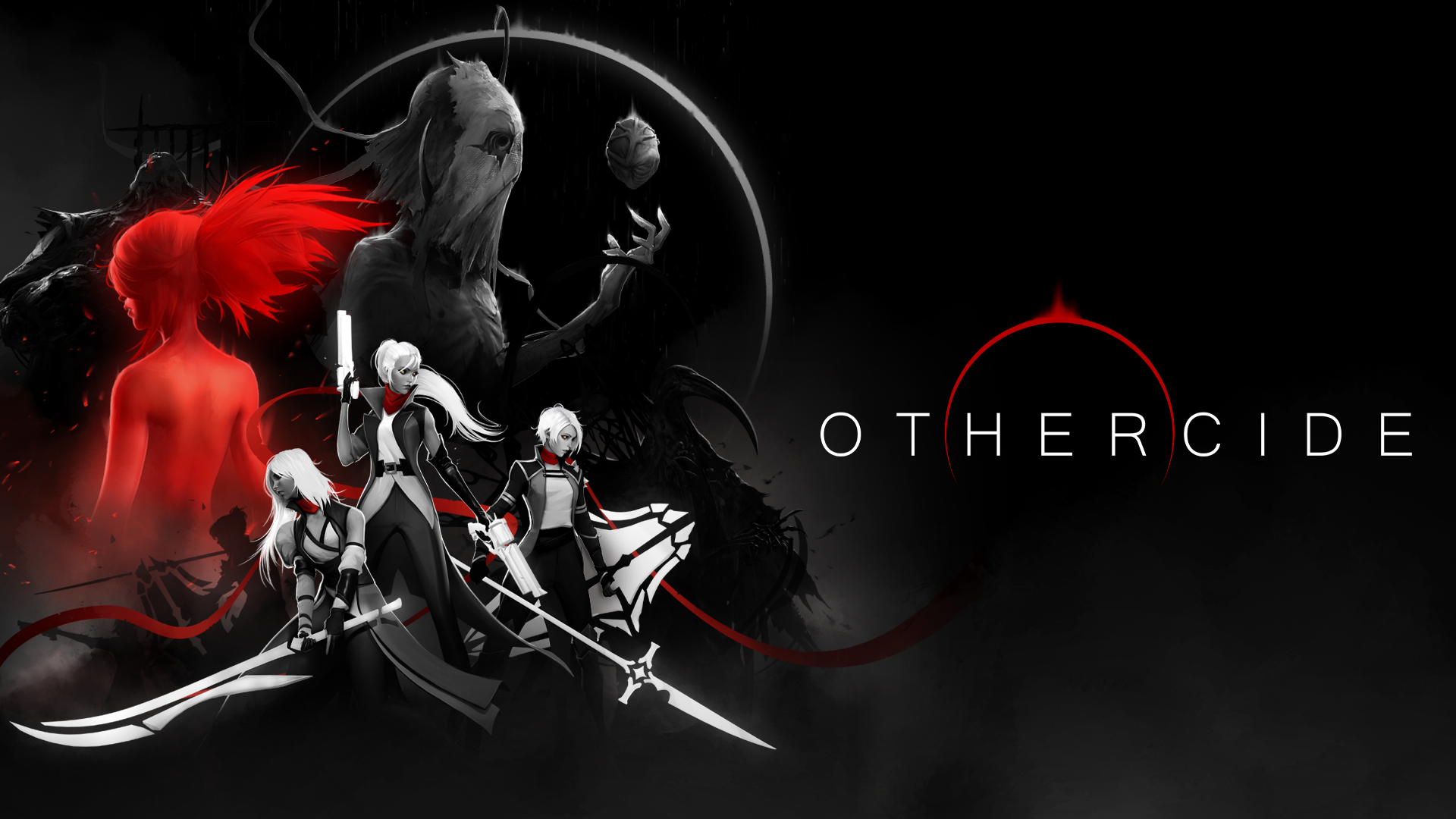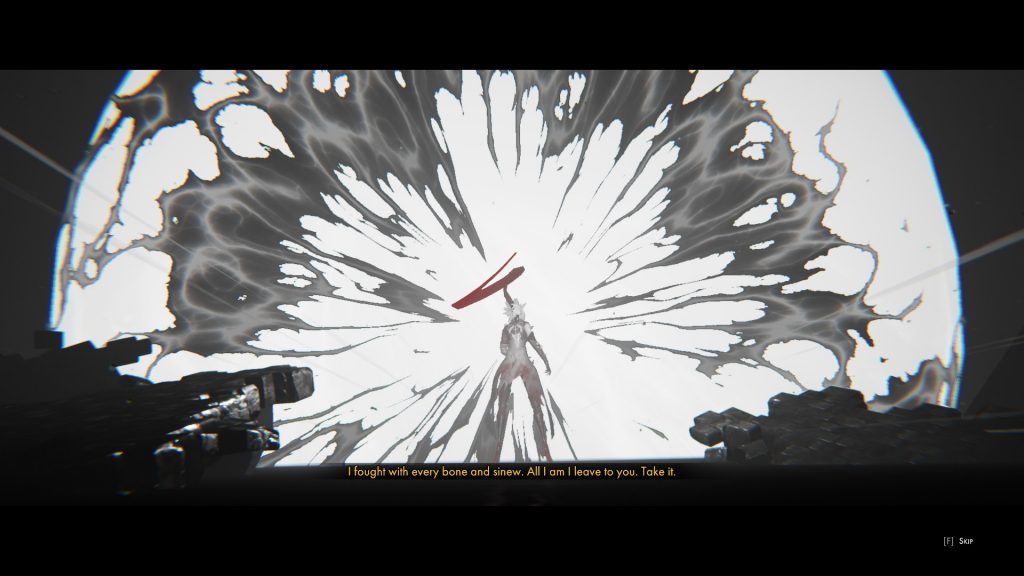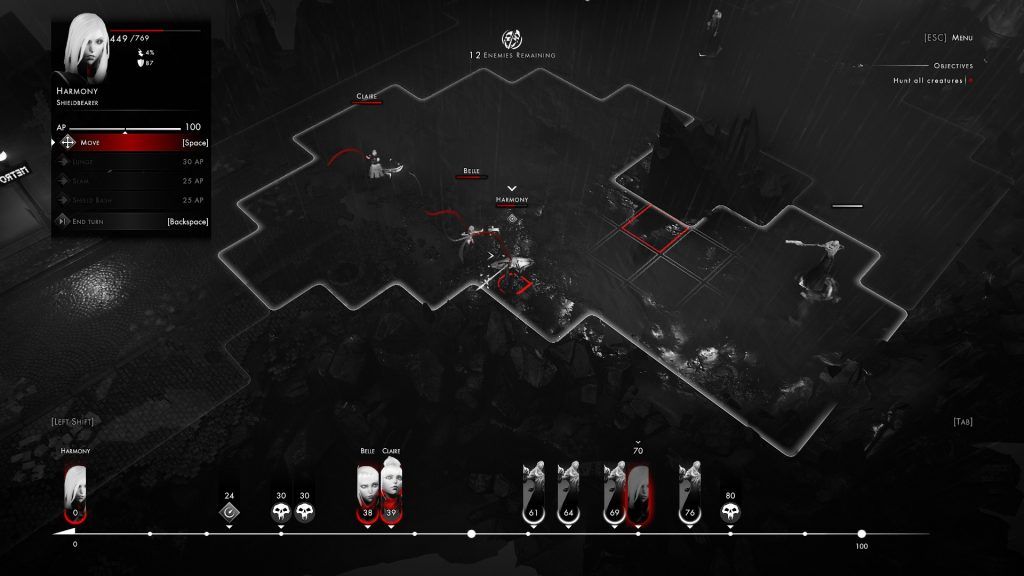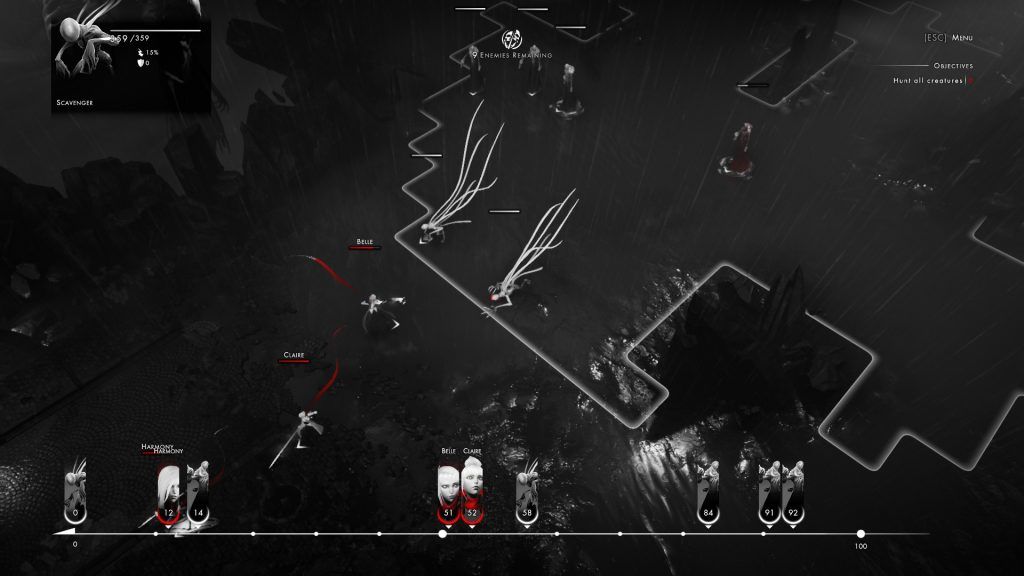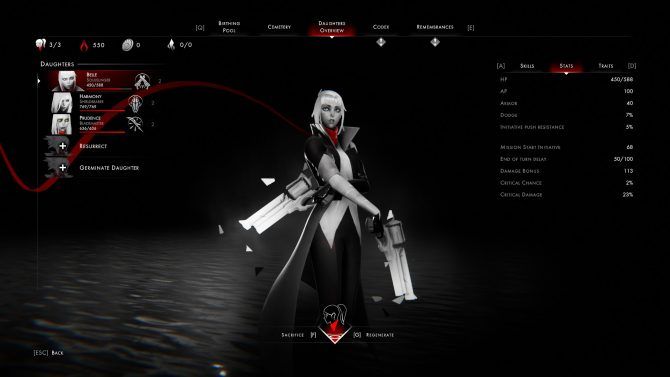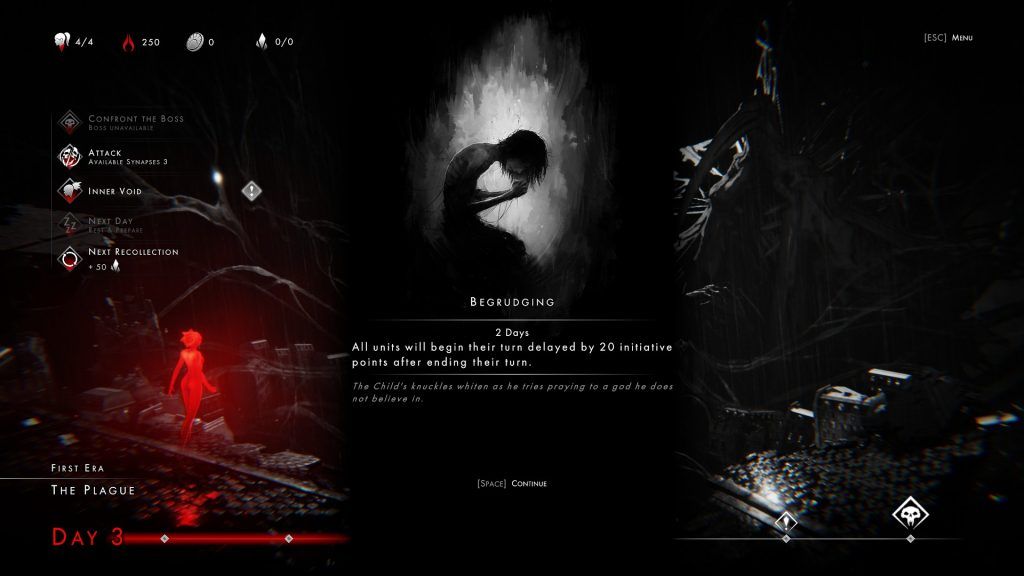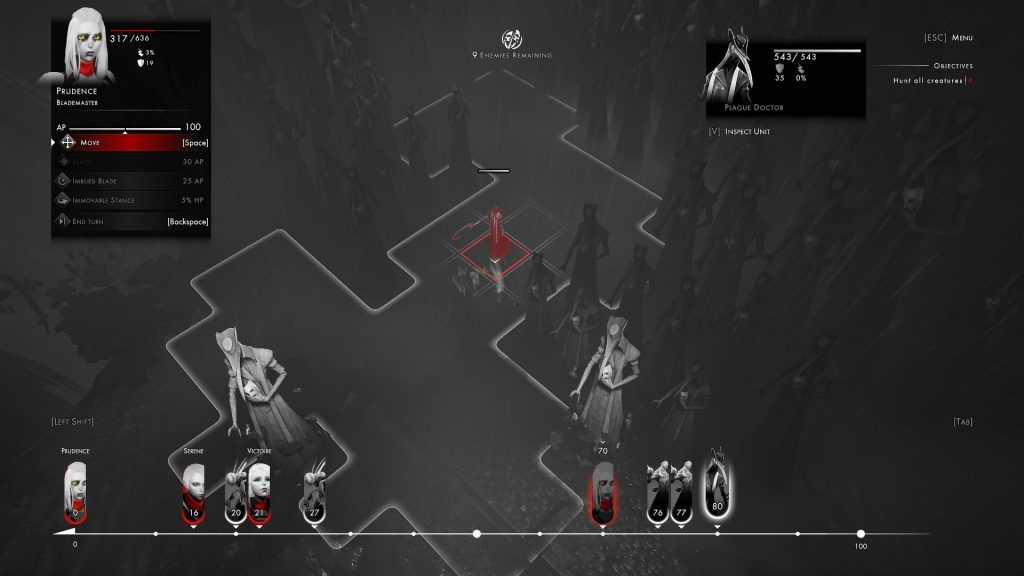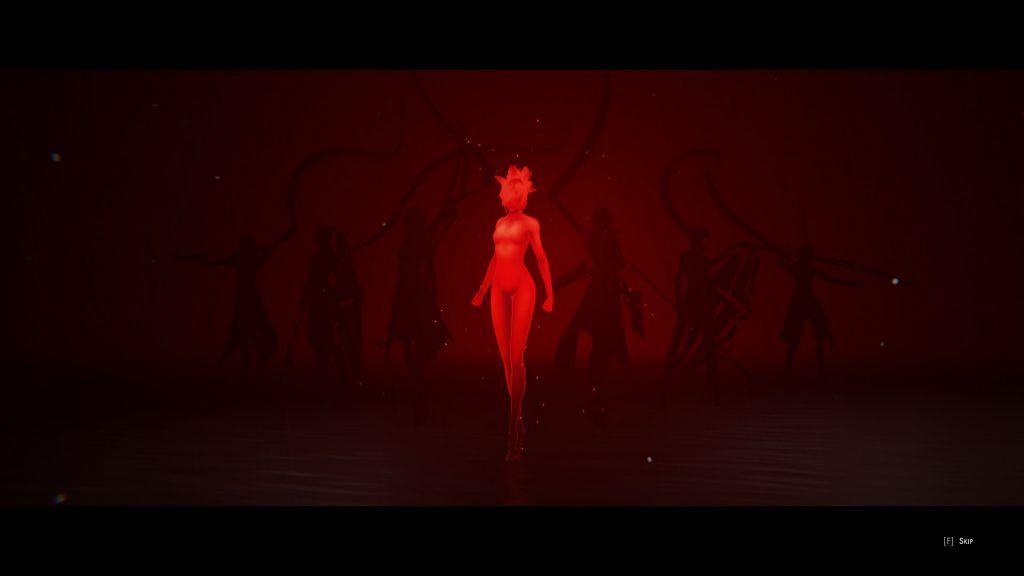It only took one trailer to sell me on Othercide and cement my desire to review it. A tactical RPG where you fight eldritch horrors, with a gorgeously stylised black/white/red visual style that evokes Sin City? Anyone familiar with my work can probably tell that I gravitate towards these games, so I was keen to sign up. Regrettably, my positive initial impressions didn’t last for long before disappointment at the awkwardly balanced systems and wasted potential set in. There's an incredibly solid core to the game, but it was quickly apparent that many of its aspirations weren't going to land.
[pullquote]"If there’s any one thing that stands out about Othercide, it’s the visuals."[/pullquote]
I have to say from the very outset that Othercide’s presentation is fantastic. The art style and colour scheme are gorgeous to behold, with the black and white only punctuated by red highlights. Each of your characters has a long flowing scarf that starts completely red but becomes increasingly greyed out as their health bar depletes, for example. If there’s any one thing that stands out about Othercide, it’s the visuals.
This is further compounded by the designs of the eldritch abominations you’re fighting. The enemy design in Othercide is full of twisted, fleshy and misshapen creatures that wouldn’t look out of place in Bloodborne or any Lovecraftian tale. Couple all that with strong voice work and music that works well to establish the gritty, sombre setting? It’s really an impressive package. Your mileage may vary as to whether it ends up creeping from stylised to “edgy”, though. The story certainly compounds that potential of going too far, with tales of twisted surgeons and corrupt priests. Nonetheless, it is unsettling and well presented throughout.
Othercide starts off with a brief tutorial mission where you play as the Mother, introducing a few of the gameplay mechanics you’ll be using in battles. Once this tutorial ends, you’re established in the core of the game. Each Recollection -- a run of the game -- is set out like a calendar, and each passing day adds a selection of battles to choose. Your units can only partake in one battle per day, so you’re encouraged to keep at least two full squads going before long. These missions also have limits on characters taken, starting with 1-3 but building up after the first boss to allow more.
Every four days, the boss of this particular sequence will be made available to fight. Come the seventh day, the boss fight becomes mandatory if you haven’t already challenged it. These are the biggest, toughest, and most dynamic encounters in the game. Beating the boss moves you to the next week/era, but losing instantly ends the Recollection. Starting a new Recollection lets you select from unlocked perks and bonuses going forward, with better bonuses and more currency to spend based on your previous performances. Rinse and repeat, getting stronger each time until you make it to the end.
[pullquote]"The enemy design in Othercide is full of twisted, fleshy and misshapen creatures that wouldn’t look out of place in Bloodborne or any Lovecraftian tale."[/pullquote]
The major gameplay loop of Othercide is split between battles and team management. The daily missions will primarily be Hunts (kill all enemies), but there are occasional variants. I’ve seen Survival (wait until an exit zone spawns, then get your units to it), Rescue (escort a helpless unit to an exit zone), and Ritual (delay and kill one enemy before it completes a ritual that instantly kills your squad). I found these alternate types to be very sparsely occurring though. For the most part, you'll be deployed with the intent to clear the map.
With all that preamble, let’s talk about how the battles work. You’ll select your units and then be taken to the stage. There, a timeline will display at the bottom of your screen, with units moving up or down it based on their actions. When they hit 0, they act. As such, you'll want your units at the front of the timeline and need to stall or focus fire enemies down before they can act. Managing the turn order is the crux of any battle, and minimising the enemy's actions while maximising yours is the aim.
When your units get a turn, they can spend Action Points to move and use any combination abilities. You’ll have 100 by default and can get more as they level, with instant actions typically requiring 25-30. However, if you end your turn with at least 50 AP remaining, that unit will act again much sooner than if fully depleted. What this means is that you’re incentivised to play conservatively, saving your burst windows for when you can avoid being punished for it. It’s a good system at heart.
You’ll frequently find enemies that will set up Delayed Actions, which usually hit hard or affect targeted areas. Avoiding these or delaying the enemies becomes the aim of the game. Your units can also utilise Delayed Actions, but you’ll have access to extremely few of them, which is a shame. More common are Reactions and Interrupts; these are abilities that have a health cost to use, but will do powerful damage and effects when their trigger conditions are met. Interrupts also have the benefit of canceling enemy attacks and performing a counterattack.
As an example: my gun-wielding Soulslinger has 100 AP. Her Shoot ability costs 25, so I can use any combination of one to four attacks. I might stay in place and use two shots, preserving 50 for a faster turn. Or, I could move 17 points of tiles and shoot three times, dishing out more damage when I can avoid the reprisal, and then moving back a single tile to break line of sight. If I cannot avoid a counterattack, I can still burn a HP cost reaction to interrupt the first attack on me. There are lots of theoretical options.
With a wide variety of hideous creatures arrayed against me, each with unique patterns and abilities, the possibilities for Othercide’s combat seem pretty varied and intricate. Unfortunately, my disappointment blossomed when I found how little reward there is to actually do anything except play safe and utilise basic moves. This all hinges on that single flaw: HP costs for many abilities. See, characters will permanently die if reduced to 0 HP (unless a rare resource is spent to revive them), and healing options are almost non-existent. To properly explain why, we need to talk about the unit management.
Your units are all Daughters, borne of the Mother from the tutorial. You spend a resource called vitae to create them, assigning them one of three classes: Shieldbearers (tanks), Blademasters (damage dealers), and Soulslingers (ranged damage/support). Each class has a unique set of abilities, and you get to choose one of two when the Daughter reaches a level milestone (2, 5, 10 and 15). There’s some variety in starting stats and ability configurations, but each class is generally going to have the same core abilities.
Daughters can be powered up in four different ways. The first and most obvious is leveling. Experience is given by completing missions and daughters level up from this with increased stats and potentially new abilities. You can spend vitae to equip Memories to their individual abilities, which add various modifiers. Memories drop from enemy kills, and can do things like increase damage, critical chance, or add effects like armour reduction or turn delay. Lastly, daughters have the chance to gain traits after combat, granting them permanent bonuses (though some also come with negatives; reducing XP gain for higher crit damage, for example).
Of these three methods, the gains from leveling up are the most significant. Even with identical traits, abilities and memories equipped, a level 7 Blademaster will outstrip a level 5 one by a good margin without fail. The only way to gain experience is through doing missions, with more gained the harder the difficulty of the battle. You can supplement it through other ways, but if the daughter doesn’t fight, they don’t become very strong.
[pullquote]"Should you want to do as I did and make a "Flesh Voltron", that's a possibility."[/pullquote]
But there is a fourth way to power up a character: Sacrifice. It’s possible to kill one of your characters off in order to grant a powerful trait to the recipient, as well as fully healing them. You can also stack these traits if you like; though you’ll only ever see one listed, the stats do go up. If you can spare the units and the vitae to produce more, this can definitely add to their power. Should you want to do as I did and make a "Flesh Voltron", that's a possibility.
This is, unfortunately, where the entire system begins to unravel. Sacrifice has the caveat of requiring a daughter be the same level or higher as the recipient in order to be used. Beyond sacrifice, you cannot heal your characters any other way. It’s possible to revive a dead daughter, but the resource to do so is very rarely acquired outside of new Recollections. If your highest level character is on low health? You either leave them on the bench, risk them in battle, or feed them into a lower level character to hopefully make them stronger. To make it worthwhile, that lower level character probably also wants to have an injury that needs healing, which means they're likely still being benched until such an occasion.
But this ends up slowing your progression even further. Remember how I said that higher levels are the biggest crux of your power? Well, even a character with a sacrificed trait is still going to have to grind up. Sadly, Othercide’s XP gains make it just that: a grind. When you can’t have a character fight more than once a day, you only get a handful of chances to net them experience.
That wouldn’t be an issue in itself if the battles were fun, and up to a point, they are. Astute readers may remember, however: all your reactions and interrupts have a HP cost to use, which is a percentage of the unit’s max. And this is why it all started to come apart before too long.
Enemy damage can be pretty high, so you’re encouraged to avoid taking it. Unless you’re going to take more damage than it would cost to use a reaction to negate it, there’s very little point to actually doing this. All the intricate combos you can perform hinge on these conditional triggers, so instead of doing anything interesting? I just found myself playing safe and utilising basic AP consuming attacks. And this got immensely dull and grindy very quickly.
Othercide’s systems have so much potential in them, but they fall so short because of these few design oversights. It’d be really fun to set up intricate combos and manipulate the timeline, but the reward is not worth the risk and cost. Instead, the best way to get ahead is just to play safe, delay opponents, and use your most basic abilities. Playing things interestingly just doesn’t do enough extra damage or effects to warrant the effort. Nothing kills the desire to experiment with interesting combos when just "move and attack twice" is easier and more effective by a good margin.
The only caveat to this is during the boss fights. In fairness, the boss fights in Othercide are pretty awesome. Bosses are well designed and fit a specific theme of the enemy types, and they’ll chime in during your runs with sinister warnings and threats. Mechanically, they’ve got large health pools and different phases of combat, with different abilities and tactics required for them. Their ability set is such that sacrificing your HP in exchange for extra damage and mitigation just might be necessary to get through.
What’s less awesome is having to fight the bosses (or even general enemies) again on subsequent Recollections. Enemy stats don’t scale, so after overcoming the boss for the first time, they’ll probably be a cakewalk on subsequent playthroughs. It’s possible to spend points to skip these earlier Eras and get back to where you were before, but that’s also less opportunity for gaining XP. This is mitigated somewhat by later Eras just having more XP from missions in general, but I still couldn’t help but feel like I wanted to spend my unlocks elsewhere. It was just one more little annoyance in an increasing pile.
I really struggled to continue to play Othercide. Eventually I was going through the motions for so long that I just couldn’t bear to carry on. It's entirely possible that later abilities or unlocks could mitigate the situation, but if there's no sign of reprieve for multiple hours of grinding at a time, players are unlikely to struggle onward. This is where I found myself, and while some may press on and find more satisfaction from the core gameplay, I couldn't do it. I can’t stress how disappointing this was to me, because I seriously wanted to love it from the outset. There is so much potential in the systems here, but they’re either not well utilised or balanced in such a way to disincentivise more creative play styles.
Games like Darkest Dungeon or Fell Seal: Arbiter’s Mark mitigate this with a variety of character classes or potential builds, but there aren’t nearly enough to do that in Othercide. Likewise, the long-term research and base management of something like XCOM does a lot to help a campaign’s variety. There’s just not enough of that here -- even with at least one new class to access later -- and doing interesting things just sabotages my run and forces additional grind on top of an already high baseline.
The only real standout feature here is the presentation, as mentioned earlier. There are times when the creepy, stylised nature crosses into overly edgy territory though; particularly when a daughter will activate a HP cost ability by slashing their wrist for the rare spurt of red colour. Othercide’s narrative isn't a primary focus either, though it does have fascinating lore and worldbuilding. It’s just not enough to carry it forward, and too often devolves into being proper noun soup until enough intentionally vague information is uncovered to figure out what’s happening. There’s definitely stuff to pick apart and digest, but it really wasn’t enough to encourage me to push on when the gameplay simply didn’t land.
[pullquote]"It seriously hurts that I didn’t like Othercide."[/pullquote]
As a quick note, the technical state of the game on PC is fairly solid. I experienced almost no technical hiccups that weren't already accounted for and should be absent from the release build. I will say that the game was likely designed with a controller in mind; playing with a mouse and keyboard as I was, I'd frequently have little moments were movement or controls would be "sticky" and unresponsive and would need a couple of clicks to get it right. Not a big deal for a turn-based game, but it happened enough to give pause, and tends to be common in games designed around a controller.
It seriously hurts that I didn’t like Othercide. I can see the potential in it, and I really can’t overstate how impressive I found the presentation and style of it all. I wanted to like it and recommend it so badly, I really did. The core gameplay idea is solid, and it's still quite possible to find enjoyment here. There are just too many little issues however that snowball into an avalanche of gameplay problems that I couldn't reconcile.
The end result is that Othercide just failed to land for me. It’s entirely possible that the developers are able to adjust numbers and patterns a little to make something more enjoyable, but until that time? I struggle to see myself recommending it to most people. Give it a shot if you’re a devout fan of the genre or really revel in the graphical style, just don’t expect anything too significant.
Othercide
- Platform(s)
- PS4, PC, Xbox One
- Developer(s)
- Lightbulb Crew
- Publisher(s)
- Focus Home Interactive
- Genre(s)
- RPG, Strategy

